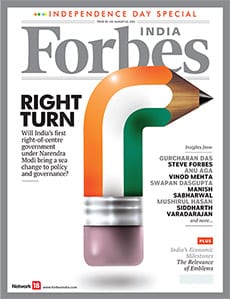India's rightward shift could not have come at a better time
Even 67 years after becoming politically free, India's economy remains shackled. The rightward shift could not thus have come at a better time


Even 67 years after becoming a politically free nation, India’s economy remains substantially shackled. We are one of the worst places to do business in we have some of the poorest people in the world, and corruption and maladministration are eating into the vitals of the nation. The rightward shift could not thus have come at a better time. It is time for new ideas, new approaches, and new experiments.
In this special Independence Day issue, Forbes India is happy to bring a complete range of views—from Left to Right and Centre —on India’s new direction. Some fear it, most welcome it. Not all of this shift in emphasis is visible as yet—as the recent Budget showed—but expectations run high that the Modi government will decisively change both the direction and content of policy and governance once he has settled in. In this issue, he will have plenty of advice and feedback on how to get there. Steve Forbes, for example, would want the rupee to become a hard currency through tight monetary management. “No country,” he points out, “can become a true global economic power without having a sound and stable currency.” Gurcharan Das tells us why India needs a strong state. His view: “Where it is needed, the Indian state is near absent where it is not needed, it is hyperactive, tying people in miles of red tape.” Swapan Dasgupta, one of the voices from the Right, offers a sobering reality check. While the elections heralded a decisive shift to the Right politically, economically it would be wrong to characterise Modi as either a Thatcher or a Reagan, he says. At best, one could consider him a non-doctrinaire leader. Voices from critics, Mushirul Hasan and Siddharth Varadarajan, are more cautious about this change in direction. They wonder if the rightward shift will inevitably give more power to the cultural Right.
We have a feast of reading material for you on I-Day.
Best,
R Jagannathan
Editor-in-Chief, Forbes India
Email: r.jagannathan@network18online.com
Twitter id: @TheJaggi
First Published: Aug 08, 2014, 07:50
Subscribe Now